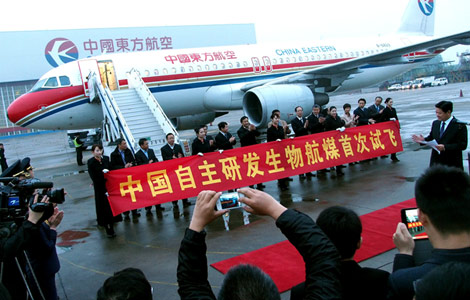| News & Events |
| Location:Home > News & Events > Science and Technology News |
| China tests self-developed biofuel flight |
People celberate a first test flight powered by self-developed biofuel made mainly from palm oil and recycled cooking oil in Shanghai, April 24, 2013.[Photo/Xinhua]
 BEIJING - China on Wednesday successfully conducted a first test flight powered by self-developed biofuel made mainly from palm oil and recycled cooking oil.
An Airbus A320 operated by China Eastern Airlines landed at Shanghai Hongqiao International Airport at 7:08 am after completing an 85-minute journey using aviation biofuel produced by Sinopec, the country's top oil refiner. The success made China the fourth country after the United States, France and Finland to boast independent production of bio-jet-fuel. The biofuel produced enough power during the test flight and "was no different from traditional fuels," according to Captain Liu Zhimin and co-pilot Zhou Xiaoqing. Xu Chaoqun, deputy head of the Flight Criteria Department of the Civil Aviation Administration of China, hailed the success as a significant breakthrough for the country's research and development of aviation biofuel. Providing it passes certain reviews, Sinopec will be granted the country's first permit of its kind for commercial use of biofuel. Company spokesman Lyu Dapeng said Sinopec will speed up the commercial application of the biofuel with the support of related parties. He acknowledged that currently the refining cost of aviation biofuel is higher than that of conventional fuels, but added alternative fuel will become mainstream in the future. With an annual consumption of nearly 20 million tons, China has become a significant consumer of aviation fuels, and the development of biofuel is expected to help ease resource pressures and curb carbon dioxide emissions in the industry. The International Air Transport Association forecast that 30 percent of aviation fuel will be biofuel by 2020. |
| Appendix Download |
|
|